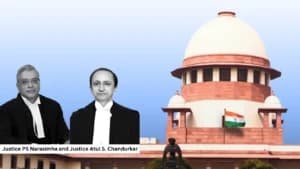The Supreme Court of India, in Smt. Bhagwati Devi vs. State of Uttarakhand (Criminal Appeal No. 2616 of 2014), delivered its judgment on 29 August 2025. The appellant, Smt. Bhagwati Devi, was earlier convicted under Section 498-A of the Indian Penal Code (IPC) for allegedly harassing her daughter-in-law, Chandra Devi, over dowry.
Chandra Devi, married to Sanjay Mishra, died on 15 June 2001 at her matrimonial home. The next day, her father, Dharmanand Joshi (PW-1), filed a complaint alleging suspicious circumstances around her death. Initially, charges were framed against her in-laws under Sections 304-B, 498-A, and 302 read with 34 IPC.
Read Also:- Supreme Court Upholds Disciplinary Action Against CISF Constable Amar Singh
While the trial court acquitted all accused of dowry death (304-B) and murder (302), it convicted Bhagwati Devi (the mother-in-law) under Section 498-A IPC, sentencing her to three years’ rigorous imprisonment and a fine of ₹5,000. This conviction was later upheld by the Uttarakhand High Court in 2014.
Bhagwati Devi challenged her conviction before the Supreme Court, arguing that:
- The original complaint (PW-1) never mentioned any specific dowry demand by her.
- Independent witnesses did not support claims of dowry harassment.
- A neighbor (DW-1) testified that no dowry demand was ever made and that the deceased herself admitted she was unwell.
- The conviction was based only on the uncorroborated statements of interested witnesses (the deceased’s mother and brother).
Read Also:- Delhi High Court Orders Release of Family Pension to Widow from Husband’s Death Date
Her counsel contended that the findings of the trial and high courts ignored the absence of credible evidence of cruelty or dowry demand.
The State of Uttarakhand, opposing the appeal, maintained that both the trial court and the High Court had rightly concluded that Bhagwati Devi harassed the deceased for dowry. The prosecution argued that dowry demands often occur within the four walls of a matrimonial home, making external evidence difficult, and hence the courts were correct in believing family testimonies.
The Supreme Court carefully examined the evidence and held that the conviction under Section 498-A IPC could not be sustained.
Quoting from its earlier judgment in Manju Ram Kalita vs. State of Assam (2009), the Court reiterated:
“Cruelty under Section 498-A IPC must be continuous or persistent, or at least in close proximity to the lodging of the complaint. Petty quarrels cannot be termed as cruelty.”
Read Also:- Rajasthan High Court Stays Installation of Dairy Booth in Bapu Nagar, Jaipur
Key findings of the Court included:
- The father’s complaint (PW-1) did not mention any dowry demand.
- The mother of the deceased (PW-3) admitted that her daughter’s married life was “happy and cordial” and that no dowry was demanded at the time of marriage.
- The brother (PW-2) also confirmed there was no dowry demand before marriage, and his suspicion was based only on doubt.
- Medical evidence showed death due to asphyxia from strangulation, but there was no conclusive link to dowry harassment.
- The testimony of neighbor Janki Devi (DW-1), who had no interest in the case, supported that no dowry demand was ever made.
The Court criticized the lower courts for ignoring these facts and for convicting the appellant without concrete evidence of cruelty or harassment.
Read Also:- Supreme Court: Vehicles Used Only Inside RINL Premises Not Liable for Road Tax
The Supreme Court allowed the appeal, stating:
“We have no hesitation in arriving at a conclusion that the conviction of the appellant for the offence punishable under Section 498-A and the sentence imposed on her cannot be sustained.”
Accordingly, the Court set aside the Uttarakhand High Court’s judgment dated 10 April 2014 and acquitted Bhagwati Devi of all charges under Section 498-A IPC. Her bail bonds were discharged, and no costs were imposed.
Case: Smt. Bhagwati Devi vs. State of Uttarakhand
Case Number: Criminal Appeal No. 2616 of 2014
Date of Judgment: 29 August 2025














